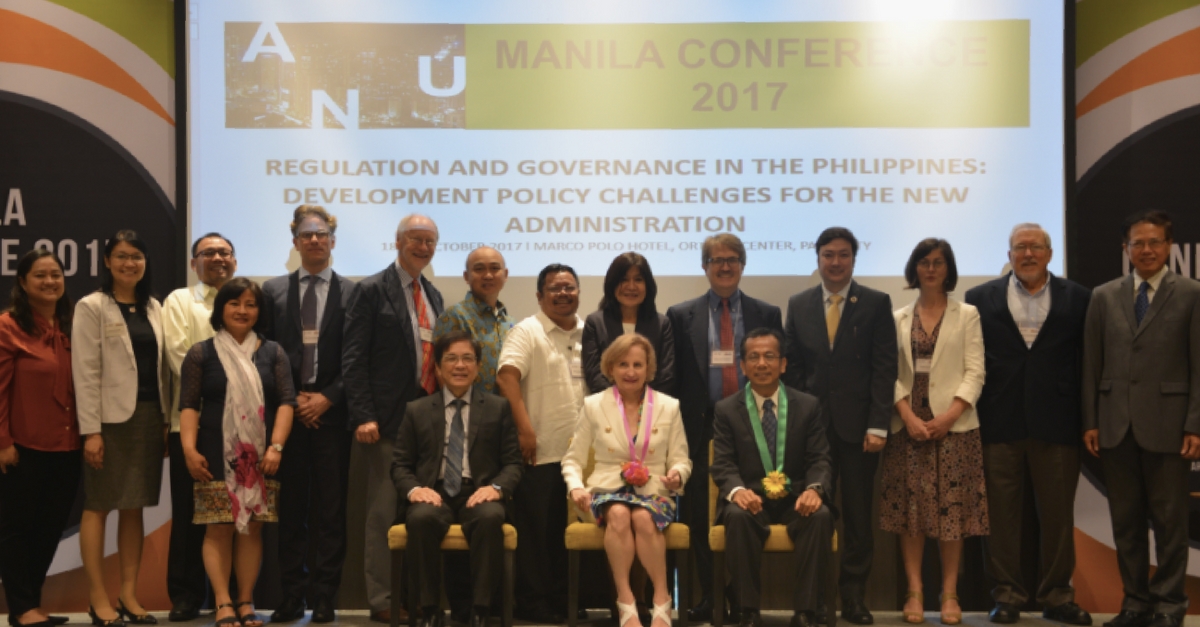
Photo of speakers and panelists from PIDS. Dr Raquiza is at the back row, 8th from left. Photo by PIDS.
Dr. Antoinette Raquiza, Associate Professor at the Asian Center, University of the Philippines, Diliman, presented her study, “The Philippine Growth Momentum and Contentious Politics” at the Manila Conference 2017 on Regulation and Governance in the Philippines: Development Policy Challenges for the New Administration, hosted last 18-19 October 2017 at the Marco Polo Hotel, Ortigas Center, Pasig City by the Australian National University and the Philippine Institute for Development Studies.
ABSTRACT
Dr. Raquiza’s presentation examines the bases of the country’s growth momentum and argues that the dramatic growth of the Philippine economy owes much to its booming international trade in services that, in turn, has contributed to insulating the economy from the vagaries of Philippine politics. The massive flow of services export receipts and remittances have contributed to the shifting basis of wealth generation in the country and development of a business sector and middle class that largely draw their dynamism from and are much more attuned to external demands, thereby, blunting the impact of contentious politics on the domestic economy. At the same time, however, a growth pattern that is highly dependent on services export seemed to have limited impact on alleviating poverty and reducing inequality – a situation that could explain the festering polarization in Philippine politics. Such trends suggest the need for the country to deepen the service sector’s linkages to domestic agriculture and manufacturing industries toward generating productive and quality employment for those left behind by the so-called growth momentum. Working to deepen the real economy would contribute to restoring the feedback mechanism between politics and the economy – a link that would go a long way in promoting an engaged citizenry and accountable government.
ABOUT THE CONFERENCE
The Manila Conference 2017 was hosted by the Australian National University and the Philippine Institute for Development Studies. The conference focused on the role of regulations in “shaping a new governance paradigm in the Philippines”, locating them in the processes of the country’s economic and political development. The conference also served as a venue of discussion on translating the vision of inclusive growth into equitable outcome under President Rodrigo Duterte’s administration, operationalizing the current economic agenda, and other pressing political issues that may impact on the economic prospects for the Philippines in 2017 and beyond.
Dr. Arsenio M. Balisacan, Chairman of the Philippine Competition Commission, served as the conference’s keynote speaker, and spoke on how to sustain the performance of the Philippine economy through evidence-based policies and regulations, and good governance.
Antoinette R. Raquiza, Ph.D. is Associate Professor at the Asian Center, University of the Philippines Diliman, where she teaches Asian studies. She heads the Asian Center’s “Bugkos” research program that examines emerging development patterns, processes, and paradigms, defining Asia and the Philippines in transition. Dr. Raquiza earned her PhD in Political Science at the City University of New York Graduate Center and is the author of State Structure, Policy Formation, and Economic Development: The Political Economy of Thailand and the Philippines (Routledge 2012). VIEW FULL PROFILE.
The UP Asian Center offers M.A. degrees in Asian Studies with four fields of specialization: Northeast Asia, Southeast Asia, South Asia, and West Asia. The Center also has an M.A. program in Philippine Studies that allows students to major in Philippine society and culture, Philippine foreign relations, or Philippine development studies. The Center offers a Ph.D. program in Philippine Studies in conjunction with the College of Arts and Letters and the College of Social Sciences and Philosophy. Get an overview of these programs. The Asian Center also houses a peer-reviewed, open-access journal, Asian Studies: Journal of Critical Perspectives on Asia. It has published several books and monographs, and hosts or organizes various lectures and conferences.

